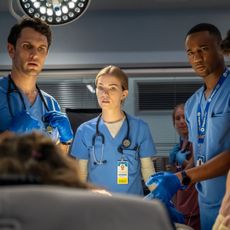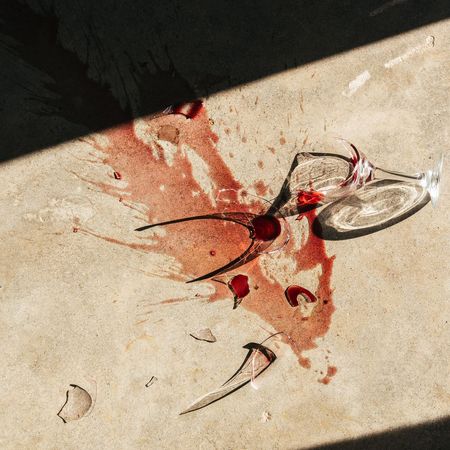I Had an Unthinkable Disease...and Made Myself Better
When I was diagnosed with multiple sclerosis, the doctors told me I could end up paralyzed. Here's how I coped.Read about more reversals of fortune:I Tackled a Powerful Family LegacyI Was a Homeless, Drug-Addicted Army Veteran
It was a cloudy December morning when I woke up, planted my feet on the floor, and realized that one of my legs wasn't following instructions anymore. My brain's message to my left leg—"let's start walking"—seemed to be getting delayed.
I chalked it up to lack of sleep. I'd been pushing myself hard of late, running my own company as a video producer, biking 30 miles before breakfast. Maybe I just needed a rest. But my body continued to go haywire that week—my hands and feet were tingling, and I felt like I had a hangover, even when I didn't. At my pilates class, my problems got me in trouble with my teacher, a fierce Italian woman who barked, "Concentrate! Focus!" (With her heavy accent, it sounded like "Fuck us!") I couldn't finish the session.
When I went to the doctor, he strapped me into an MRI machine that same day, telling me not to move. As I lay still amid the machine's clanking and whirring, I thought, This could be life-changing.
I was right. The diagnosis came a day later: multiple sclerosis, or MS, the autoimmune disease that causes everything from muscle weakness to complete paralysis. A lesion on my spinal cord, up near my neck, was to blame for my symptoms, the doctor said. "Come to the hospital now," he told me over the phone. "If you don't act fast, you could end up paralyzed."
The words didn't really register. As a single, 34-year-old woman living in New York City, I was always on the move—running down subway steps, jogging in the park. Me, paralyzed? No.
I think I was in shock when I grabbed my wallet, hopped in a taxi, and headed for the hospital. I'll never forget that cab ride: It was December 22, 2006, just three days before Christmas. The city was in its most glittering, festive mode. The sidewalks buzzed with shoppers; storefronts shimmered; twinkling lights dangled from tree limbs. As I rolled past, I felt like I was moving in slow motion, while the city whirled around me. I was supposed to be going on a third date with a guy that night; instead, I had to let him know I was hospital-bound, with MS. (The news put an end to that budding romance.)
I spent two days in the hospital, receiving a wallop of intravenous steroids, which the doctors said would help calm inflammation in my central nervous system. On Christmas Eve, I flew to my parents' home in Palm Beach. An immaculate Disney World of a town where everyone pays a lot of money to escape reality, it was a surreal place to be facing up to my new life. "You look gray," Mom said when she saw me, a worried look in her eyes.
Stay In The Know
Get exclusive access to fashion and beauty trends, hot-off-the-press celebrity news, and more.
I Googled my disease constantly that week, as terms like "blindness" and "loss of bowel control" flashed before me. New symptoms of my own cropped up by the day. My neck hurt; my face felt frozen. That's when the fear really hit—fear so deep-rooted, it was hard to even talk to my family about it. My parents tried to be cheery, but I could sense their distress. Nothing could make this better.
I thought about how I'd hoped to meet a guy in the coming year, to eventually get married, have kids. I'd finally recovered from a broken engagement that had shattered me two years earlier, when my fiancé had come home one night—just two months before our wedding—and said, "I don't think I can get married." Now I'd have to tell guys that I had MS. As if dating weren't hard enough.
Back in New York, people tried to say reassuring things. "You could have a good 20 years before you're in a wheelchair," a friend said. Others were confused; they thought I had Parkinson's disease, like Michael J. Fox. At the recommendation of my doctor—Dr. Aaron Miller at the CGD Center for MS at Mt. Sinai—I started injecting myself daily with Copaxone, a medicine that wards off symptoms. The first time I jabbed the needle into my flesh, my hands shook, and I felt sick.
While I waited for the medicine to kick in, the new symptoms kept on coming: My feet would feel numb, or I'd have head tremors, or I'd wake up and feel disoriented. One night, I stood up and walked into a wall. Each new episode sent me down a rabbit hole of fear.
Several months in, I hired a yoga instructor to try to maintain some sort of calm. He told me, "Kate, you've been living on adrenaline for so long, you haven't been breathing." Then he helped me meditate, breathe deeply, and focus my thoughts, instead of letting them run wild, finding their way to the darkest of places.
The yoga helped me relax, but one morning in class, my body was tingling so badly that tears started streaming down my face. My instructor walked over, put his hand on my shoulder, and reassuringly said, "It's OK. You're here." Something about his words soothed me, and that became a defining moment. While in my warrior pose (I kid you not), I decided: That's it. I am not going to be helpless.
From that day on, I started looking at things differently. When scary thoughts entered my head, I would say aloud, "Out." When I would happen to see someone in a wheelchair, I'd say to myself, "Not today!" Instead of dreading my daily injection, I began to think of the shot as representing a million little men in lab coats who had worked hard to get me this medicine.
I took my new regimen a step further, going to see an osteopath named Dr. George Kessler, known for a more holistic approach to health. He asked me all kinds of questions—about my friends, family, the air I breathed, the food I ate. Then a nurse took some blood samples—a whopping 21 vials, in fact. The goal was to test me for things like food allergies, toxins, and bad bacteria, and then help me rebalance my system so it could start to repair itself. Dr. Kessler said, "I've always been told that MS is an irreversible condition, that the best hope is to slow its progression." But, he added, "that has not been my experience."
His words sparked an idea. I thought, Why couldn't I reverse this disease? I taped a piece of paper to my bedroom mirror that said, "Reverse it." I started repeating those words to myself a thousand times a day: Reverse it. Reverse it. Reverse it.
Dr. Kessler sent me a colossal box of vitamin supplements. I counted more than 20 big bottles of pills, with names like Vitamin K2 and Coenzyme B Complex. My doctors at Mt. Sinai weren't really on board with this program; they said to stay on track with my medical regimen, which I did. Other people were skeptical, too, including my twin brother, Chris, who thought Dr. Kessler was preying on my desperation. My mom asked, "Are you sure this guy isn't a quack?"
My life soon revolved around a slew of supplements. I'd swallow 15 pills at breakfast, then do my injection, while thinking, Reverse it. For lunch, more pills, liquid supplements, and freshly ground organic flaxseed. I had nine fillings removed from my teeth, to rid my body of the mercury. I also went to a Japanese Reiki healer, who placed her hands over various parts of my body; it made me feel peaceful and calm. Nothing voodoo-esque.
The bills poured in by the day: $1000 for the dentist, $250 for a vitamin shipment. Health insurance covered the regular medical costs; as for the complementary treatments, I was on my own.
I developed a whole new outlook. My life had always been about push, push, push. Now I finally started cutting myself some slack. I trimmed my workload. I toned down the intense bike rides. I got in bed before midnight. And I came to understand something about myself: When I was always on the move, I didn't have to think too hard about my life. When standing still, I had to stare reality straight in the face. No bullshit, no avoiding. Yes, I felt like I was swimming against the current in New York City; after all, this is a town where everyone is always in a hurry, going somewhere, focusing on what's next. But here's the thing: I started to feel better.
A year after my diagnosis, in December 2007, my moment of truth came. It was time for a follow-up MRI, my first one since the lesion had been spotted. I bundled up in my scarf and hat and headed for the hospital. I'd spent so much time thinking about reversing my disease, it was hard to consider the very real fact that the disease could've progressed. You just never know.
A day after my scan, I met with one of my doctors at Mt. Sinai, Dr. Stephen Krieger. His words floored me: No new lesions. As for the lesion that had caused all my problems? It had "faded significantly," he said.
"Is it smaller?" I asked him.
"It's actually so faint, the radiologist didn't recognize it," he said. "That's as good as it gets."
I tried to wrap my head around his words. The only thing I could think to ask was, "Is it normal for it to be fainter?" I put my face in my hands and started crying.
"It's not normal for people to cry when I give them good news," he replied.
At Christmas, I delivered the news to my parents. We broke down in tears, and Dad hugged me tight. He's the only one I'd told about my "Reverse it" chant. (My mom is way too rational.) "You did it," Dad whispered.
Yes, my story is controversial. People worry that I'll spread false hope. Once, a woman who had suffered from MS for 30 years said to me from her wheelchair, "Don't tell me to put a Post-it note on my mirror—give me a break." Some say maybe I never had MS to begin with. All I know is that the doctors diagnosed it, and I have the before-and-after MRI scans to prove that a lesion had come and gone.
I continue to take the injections, along with a few vitamins. In March 2009, I had another scan—no new disease activity. Around the same time, a friend introduced me to a guy named Tyler. A funny, sexy, sensitive man, he knew a lot about MS, since someone in his family had a similar illness.
On our third date, he made it clear that MS didn't factor into how he defined a partnership. Five months later, he asked me to marry him, while we were sitting in a meadow in Central Park, surrounded by sunbathers and frisbee-throwers. That would've been enough for me. But then he walked me down the street to the Ritz, where he'd booked us a room for the night—on the top floor. I stood at the window, gazing out at the sprawling urban view. Above, slate-gray storm clouds loomed over the skyscrapers. But below, Central Park stretched out for miles, lush and green, between the avenues. It looked to me like a long, wide runway.
To see an online documentary of Kate Milliken's experience, including interviews with her doctors and before-and after MRI scans, go to katescounterpane.com. Abigail Pesta is the editor-at-large of Marie Claire.
Abigail Pesta is an award-winning investigative journalist who writes for major publications around the world. She is the author of The Girls: An All-American Town, a Predatory Doctor, and the Untold Story of the Gymnasts Who Brought Him Down.
-
 These Chic On-Sale Finds Will Define My Rich-Looking Summer Wardrobe
These Chic On-Sale Finds Will Define My Rich-Looking Summer WardrobeI'm getting ahead with these under-$200 tank tops, staple denim, and breezy dresses.
By Brooke Knappenberger Published
-
 Will 'Pulse' Return for Season 2 After Its Finale Left Us With Heart Palpitations?
Will 'Pulse' Return for Season 2 After Its Finale Left Us With Heart Palpitations?We need to know about the future of the central will-they-won't-they STAT.
By Quinci LeGardye Published
-
 Demi Moore Chopped Her Signature Long Locks for a Rich Girl Lob
Demi Moore Chopped Her Signature Long Locks for a Rich Girl LobThe actress revealed a chop that is old-money coded.
By Ariel Baker Published
-
 Senator Klobuchar: "Early Detection Saves Lives. It Saved Mine"
Senator Klobuchar: "Early Detection Saves Lives. It Saved Mine"Senator and breast cancer survivor Amy Klobuchar is encouraging women not to put off preventative care any longer.
By Senator Amy Klobuchar Published
-
 I'm an Egg Donor. Why Was It So Difficult for Me to Tell People That?
I'm an Egg Donor. Why Was It So Difficult for Me to Tell People That?Much like abortion, surrogacy, and IVF, becoming an egg donor was a reproductive choice that felt unfit for society’s standards of womanhood.
By Lauryn Chamberlain Published
-
 The 20 Best Probiotics to Keep Your Gut in Check
The 20 Best Probiotics to Keep Your Gut in CheckGut health = wealth.
By Julia Marzovilla Published
-
 Simone Biles Is Out of the Team Final at the Tokyo Olympics
Simone Biles Is Out of the Team Final at the Tokyo OlympicsShe withdrew from the event due to a medical issue, according to USA Gymnastics.
By Rachel Epstein Published
-
 The Truth About Thigh Gaps
The Truth About Thigh GapsWe're going to need you to stop right there.
By Kenny Thapoung Published
-
 The High Price of Living With Chronic Pain
The High Price of Living With Chronic PainThree women open up about how their conditions impact their bodies—and their wallets.
By Alice Oglethorpe Published
-
 I Used to Imagine Murdering the Men I Dated
I Used to Imagine Murdering the Men I DatedFalling in love helped me finally figure out why.
By Jessica Amento Published
-
 60 Workout Apps for Women Who Want Results (Without a Gym Membership)
60 Workout Apps for Women Who Want Results (Without a Gym Membership)Buying Guide Easy fitness plans you can follow without fear of judgment.
By Bianca Rodriguez Published